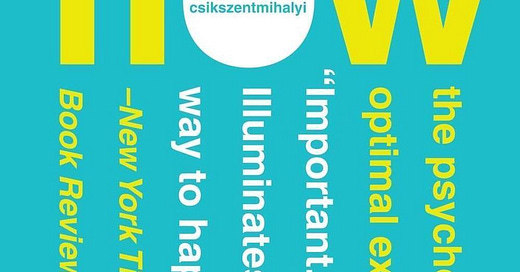Flow: The Psychology of Optimal Experience
Mihaly Csikszentmihalyi, 1990
Key words:
Psychology, personal development, lifelong learning, autotelic, Stoicism, philosophy, happiness
Finding Flow
When I caught myself referring to flow in conversation, then realized my grasp of what psychologist Hungarian-American psychologist and university professor Mihaly Csikszentmihalyi (chick-sent-me-hai) meant by the term was on par with my comprehension of the plot of The Good, The Bad and The Ugly (Eastwood. Scowling. Guns. Is there more?) it seemed time to read the book.
Turns out flow is more complex ‘doing things you like makes you feel nice.’ Precisely, it transpires that flow – or ‘optimal experience’ – is not just about feeling nice. It’s about self-management, attitude adjustment and generating positive challenges in one’s life.
Sounds like a lot of work, right?
Well, yes. But then, aren’t most worthwhile things? Csikszentmihalyi might reply.

The big idea
To be happy, one has to get their mind right.
“Happiness is not something that happens,” Csikszentmihalyi writes. “It does not depend on outside events, but, rather, on how we interpret them. Happiness… is a condition that must be prepared for, cultivated, and defended privately by each person.”
This assertion, the author acknowledges, is borrowed from Epictetus who, a couple millennia ago, pointed out that “weeping... lamenting… misfortune…” are all matters of judgment.
A person is as happy as they decide to be.
What differentiates Csikszentmihalyi’s work from the glib visualize-your-best-life spiels prevalent in weekday morning yoga classes is that he (unlike the feel-good crew) believes that “the universe was not created to answer our needs.”
Thus individuals are responsible for grabbing whatever tools are at their disposal and grubbing what satisfaction they can out of life.
Nobody said freedom is free.
The good news, according to Csikszentmihalyi, is that the tools are available to everyone. “Attention is like energy…” he asserts. “We create ourselves by how we invest this energy. Memories, thoughts, and feelings are all shaped by how we use it. And it is an energy under our control, to do with as we please.”
Harness this attention, he advises, and invest in enjoyable activities. Enjoyment (distinguishable from pleasure) is
“characterized by this forward movement: by a sense of novelty, of accomplishment. Playing a close game of tennis that stretches one’s ability is enjoyable, as is reading a book that reveals things in a new light, as is having a conversation that leads us to express ideas we didn’t know we had.”
Csikszentmihalyi’s research identified these elements of an enjoyable experience:
Is suited to the doer’s skills and abilities.
Has clear goals.
Provides immediate feedback.
Demands concentration and blocks out routine worries and frustrations.
Gives a sense of control.
Eliminates self-absorption.
Alters time, so hours fly by, or moments stretch out.
Flow’s examples of suitable activities range from performing surgery to racing sledge-dogs. The point is not what one does, but how one does it.
In one memorable anecdote, Hungarian intellectuals jailed under communism created enjoyment and purpose by organizing poetry translation competitions, which had to be carried out through elaborate secret communications.
Crucially, the optimal experience is intrinsically rewarding or, to use Csikszentmihalyi’s term, autotelic (auto = self, telos = goal): “a self-contained activity, one that is done not with the expectation of some future benefit, but simply because the doing itself is the reward.”

My take
Makes perfect sense but, as the author admits, there is privilege at play. The world is full of people who, for reasons of socioeconomics, gender, education, accident of birth or birthplace, etc. don’t have the agency, capacity or ability to build much flow. The optimal experience requires, if not optimal, at least tolerable conditions.
Or – as in the case of the Hungarian dissidents – robust intellectual resources. “If you’ve got any education,” opines Bozo, a tramp George Orwell befriended and quoted in Down and Out in Paris and London, “it doesn’t matter… if you’re on the road for the rest of your life…. You can still keep on with your books and your ideas.”
Their take
“These arguments and observations are not altogether original; yet the manner in which Csikszentmihalyi integrates research on consciousness, personal psychology and spirituality is illuminating.”
– Thomas Davey, LA Times, Aug. 21, 1990
Must read for
Bright teenagers
Political prisoners
The well-fed but psychically undernourished
Read also
The Discourses by Epictetus
Meditations by Marcus Aurelius
The Age of Absurdity: Why Modern Life Makes it Hard to Be Happy by Michael Foley




